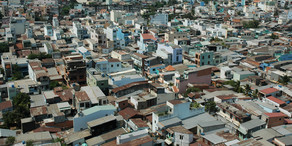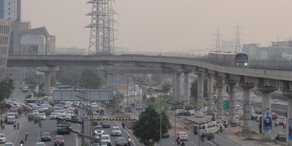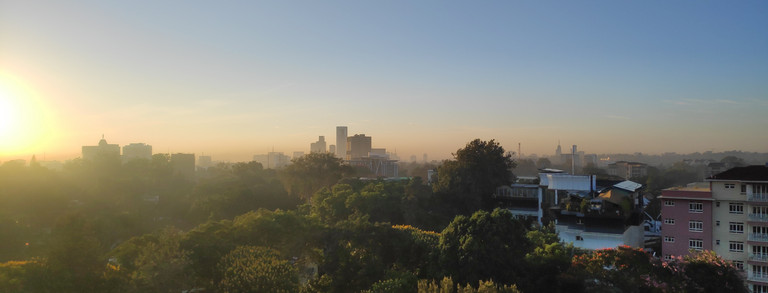Ausschreibung einer Seminarreihe für NachwuchswissenschaflerInnen

Weitere Informationen zur Ausschreibung und wie Sie sich bewerben können finden Sie hier.
Frist zur Einreichung: 19.09.2025!
Introduction
“Epistemes of non-dominant inhabitation: a seminar series for early-career and under-represented scholars to decentre urban knowledge” seeks to confront the dominance of Western theorising of urban inhabitation, as well as the under-representation of the voices of ECRs and academic precariats in urban theory. Building on an initial hybrid double-session at the 2023 Royal Geographical Society (RGS-IBG) Annual Conference on ‘Emerging geographies of non-dominant inhabitations’, this seminar series responds to both an intellectual and structural injustice in urban knowledge production. It highlights the contributions of early-career and underrepresented scholars who explore diverse forms of urban inhabitation, moving beyond what we typically consider “normal” ways of dwelling. By delving deeply into the everyday lives of urban residents, the series aims to question the governmentalities that prescribe how people should be living in the city (such as through property ownership, institutional shelters, social housing). Querying the dominant framings of marginalised urban living as ‘exceptional’ or ‘deviant’ across disciplines spanning urban studies, geography, development studies, anthropology and planning, this seminar series seeks to decentre academic knowledge production. It aims to significantly advance theorisation and counter-mainstream understanding of urban inhabitation by critically examining “non-dominance” as a conceptual and empirical entry point.
Contemporary scholarship analyses urban transformation processes in two distinct ways. On the one hand, a brand of scholarship has highlighted the revanchist aftermaths of neoliberal transformation, manifested through gentrification, emergence of exclusionary discourse of citizenship (Brenner and Schmid, 2015; Lees, Shin and López Morales, 2016; Roy 2009; Watson 2014; Escobar 2019). On the other hand, scholars, albeit within the analytical framework of systemic oppression, have rebranded responses to urban marginality and dispossession as politics of the informal, entrepreneurial, resistant, navigational and radical (Anjaria and McFarlane 2011; Bayat, 2012; Varley 2013; Lancione 2020; Boano and Astolfo 2020). In both these epistemologies marginalised living in the city have been presented as ‘exceptional’ obscuring the more ordinary experiences of inhabitation (Banerjee 2023a), subversions to systemic dispossession and expressions of aspirations of urban dwellers who imagine and inhabit the city in ways that do not fit with the mainstream understanding of urban inhabitation (Banerjee 2023a, 2023b; Beier, 2023a, 2023b). Regarding ‘non-dominance’ as an analytical entry-point, this seminar series de-centres knowledge production on non-dominant urban inhabitation in two ways.
One, we define ‘non-dominance’ as spatio-temporal ontologies located at peripheries of power which can be read through the deviations from normative expectations of habitability (Banerjee, 2023a). For many urban poor, livelihood choices, access to basic services, and social and political networks are shaped by how they inhabit the city—an aspect often overlooked by developmental interpretations of welfare and housing (Turner, 1976). While we pay particular attention to the hegemonic iterations of housing that practices from the ground-up resist and reorient to address dispossession and meet aspirations of urban life. We also question the treatment of ‘difference’ as radical (Simone 2016; Lancione, 2020) as not all deviations arise from a conscious countering of power. We question the developmental and humanitarian manifestations of housing as a key register of urban citizenship not only foreclose possibilities and politics of dwelling but also eliminate varied ways people live and feel ‘at-home’ in the city (see images 1 and 2 below). Non-dominant inhabitation thus extends beyond materialities (such as a house) and are entangled in myriad social, spatial, economic and temporal processes of staking a claim to urban space. It also de-centres theory of housing/dwelling from idealised notions of ontological security to discuss inhabitation in geographies of occupations, violence, demolitions, contestations (Handel, 2019).
Two, this seminar series prioritises early career researchers, under-represented scholars (URSs), and what Butcher et al. (2025) have recently referred to as the academic precariat . It is aimed at creating a collective of scholars who query the experiences of inhabiting the city diverging from familiar conceptual categorisations. We question the dominant representations of the Third World city (such as through slum-centrism or ‘informality’) and the erasure of dwelling practices that exist at the intersection of permanence and temporariness refugee camps, homes in settler colonial contexts, pavement dwellers).







